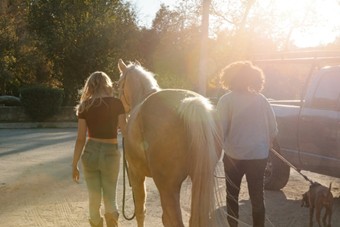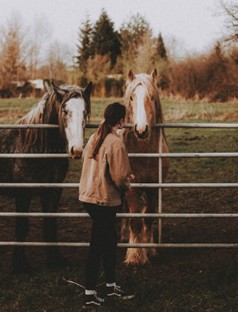Finding the Right Horse-Centered Program for Personal Growth
For families curious about various pathways to explore personal development, programs that revolve around human-horse interaction are gaining traction as transformative experiences. If you’re a parent seeking a nurturing environment for your child to enhance confidence, emotional awareness, or interpersonal skills, these programs provide a unique blend of physical engagement and emotional growth. Equine therapy programs harness the intuitive and nonjudgmental nature of horses to foster healing and personal insight.
Understanding the Benefits of Working with Horses
Horse-centered programs encompass a range of activities that integrate horses into personal development, education, or therapeutic contexts. These may include riding lessons, horsemanship training, and therapeutic interactions facilitated by professionals. The core idea is that working with horses fosters a deep connection, promoting self-awareness, emotional regulation, communication skills, and even physical coordination.
Horses, as sensitive and intuitive animals, respond to human emotions and behavior in ways that can provide immediate feedback. For example, building trust with a horse requires patience, calmness, and clear communication, skills that are transferable to everyday life challenges. Participants often find that their interactions with horses open new avenues for self-expression and personal insight that traditional talk therapy or classroom learning might not fully provide.
Clarifying Your Goals for Personal Growth
Before choosing a program, it is crucial to clearly define what you or your child hopes to achieve. Different programs specialize in various outcomes.
If the goal is therapeutic in nature, such as addressing anxiety, depression, or social difficulties, look for programs specializing in equine-assisted psychotherapy or learning. If the focus is on character building, confidence, and life skills, a program blending horsemanship and personal development might be ideal.
Knowing your goals helps narrow down your search and ensures the program you choose aligns with your expectations, maximizing the potential benefits.
Researching Program Credentials and Expertise
The quality and safety of a horse-centered program are paramount, particularly when vulnerable individuals are involved. Programs affiliated with recognized professional organizations often adhere to rigorous standards in both horse care and participant support.
Staff experience working with diverse populations – children, adults, individuals with disabilities, or those coping with trauma – is another critical factor. Programs that tailor their approach to the specific needs of participants tend to deliver better outcomes.
In addition, well-trained, temperamentally suitable horses contribute greatly to a safe and positive experience. The program should prioritize animal welfare, as a healthy and content horse is essential for fostering meaningful human-animal connections.
Evaluating the Program Environment and Facilities
Safe, clean, and well-maintained facilities reflect the program’s commitment to quality and participant well-being. Adequate space for riding, grooming, and other equine activities should be available, along with comfortable areas for instruction or therapy sessions.
Notice how the horses behave and how instructors manage the sessions. A calm and positive atmosphere usually indicates a thoughtful, participant-centered approach.
Accessibility is also important. Consider the program’s location, scheduling flexibility, and accommodations for individuals with physical or sensory challenges. The right program should be inclusive and adaptable to meet diverse needs.

Understanding the Program Structure and Curriculum
Horse therapy programs that are integrated into residential treatment for teens often follow structured, therapeutic models that combine emotional growth with hands-on skill development. They are purposefully designed to support long-term healing and behavioral change within a holistic treatment environment. Depending on the facility, some programs may offer daily equine interaction as part of the therapeutic schedule, while others integrate horse-based sessions several times per week alongside traditional counseling, academic support, and life skills training.
Understanding the rhythm and depth of these programs is essential for families considering residential care. Ask about how the equine component is woven into the broader treatment plan, whether it emphasizes trauma recovery, emotional regulation, communication skills, or leadership development. High-quality equine-assisted residential programs will have defined goals for each stage of participation and offer progress tracking through therapist-led evaluations, equine specialist feedback, and parent updates. These experiences go far beyond learning to care for a horse – they become a mirror for personal growth, emotional resilience, and trust-building that extends into every area of a teen’s life.
Considering Emotional and Physical Safety
Working with horses involves inherent risks, so safety protocols must be strictly enforced. Confirm that the program adheres to industry standards for helmet use, supervision ratios, and emergency procedures. Staff should be trained in first aid and equipped to handle both human and equine emergencies.
Emotional safety is just as important. Particularly in therapeutic programs, the staff should create a supportive, non-judgmental environment. Participants should feel empowered to express their feelings and work through challenges at their own pace. Confidentiality policies and respect for privacy are key elements of a trustworthy program.
Hearing from Other Participants and Families
One of the best ways to gauge the effectiveness and atmosphere of a horse-centered program is to hear firsthand accounts from current or former participants and their families. Testimonials, reviews, and personal stories can provide insight into the real-world impact of the program and the quality of care. These conversations can reveal how the program handles challenges, celebrates successes, and adapts to individual needs.
Making the Decision: Matching Fit and Philosophy
Ultimately, finding the right program boils down to a combination of practical considerations and personal fit. The philosophy and values of the program should resonate with your own approach to growth and healing. The staff should inspire confidence, and the horses should appear well cared for and responsive.
Take your time with the decision, visiting multiple programs if possible, asking detailed questions, and reflecting on what feels right. Remember that the right program will not only offer skill development or therapeutic benefits but also foster a genuine connection to the animals and a supportive community.
Supporting Continued Growth Beyond the Program
Personal growth is an ongoing process that benefits from continued practice, reflection, and support. Whether through further lessons, joining riding clubs, or engaging in related activities, staying connected helps sustain progress.
Encourage open communication about experiences and feelings as they arise, and work with program staff to create plans for ongoing development. Some programs offer alumni events, mentorship, or opportunities to deepen horsemanship skills, all of which can enrich the long-term benefits.
The Path to Growth and Healing
Horse-centered programs provide a unique and powerful avenue for personal growth, blending physical activity, emotional exploration, and meaningful animal connection. By thoughtfully considering your goals, researching program quality, ensuring safety, and seeking a good philosophical match, you can find a program that offers lasting benefits. For parents and individuals alike, this journey can open doors to confidence, resilience, and new ways of relating to the world, one step, and one horse, at a time.






